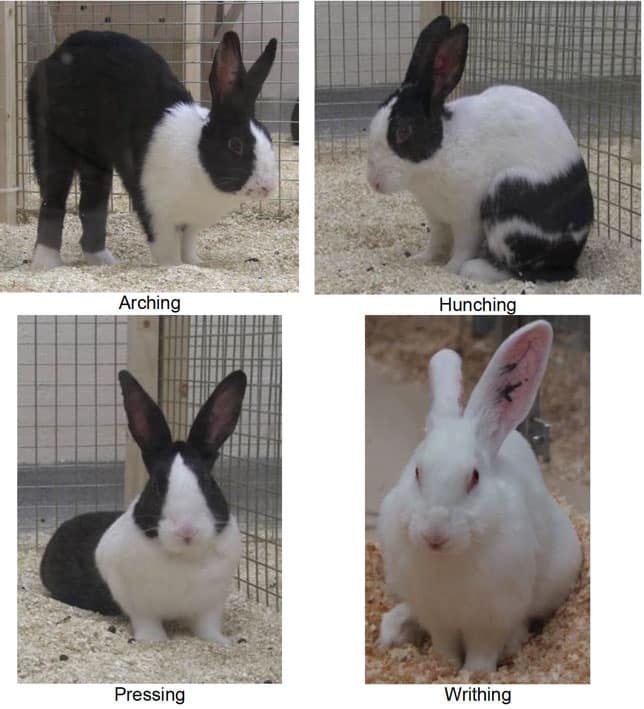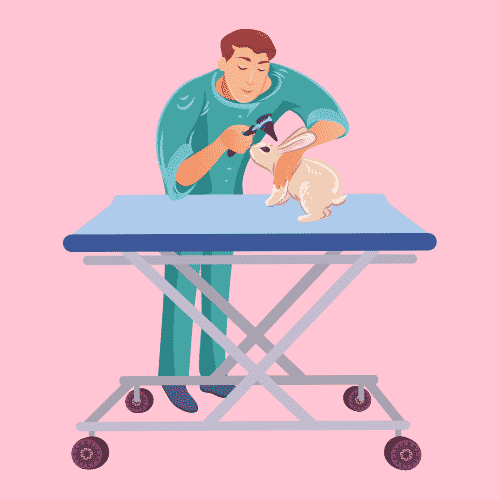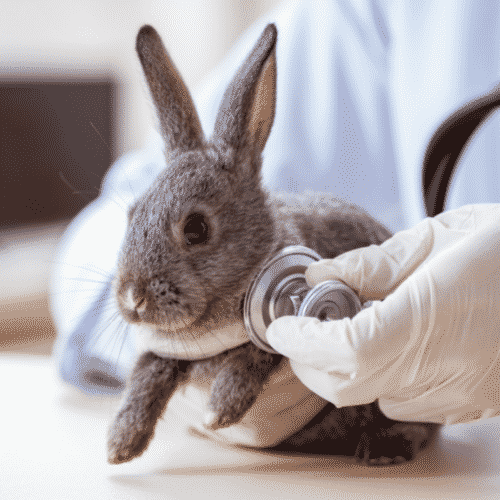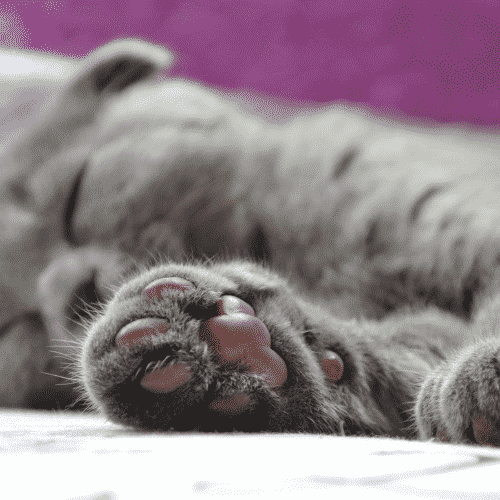Bunny owners usually know when something is wrong with their little bunnies, but what if you’re a first-time buyer? You may not be sure how to tell if your rabbit is healthy or in pain… don’t worry! Rabbits generally spend the majority of their time upright, and express pain by sitting hunched over, but to be sure we’ve included tips on some common medical problems you should be aware of.

Hunched Posture in Rabbits – What It Means?
Have you ever tried to determine if a rabbit was ill or just sleeping? When your rabbit is acting a bit like the Hunchback of Notre Dame, it could be a sign they are in pain. Learn what a hunched position looks like and how to properly care for your sick rabbits.
Understanding the Rabbit Hunched Position
Inflammation of the stomach is one of the most common disorders in rabbits. This is frequently the result of a rabbit eating too much, too fast. This can result in a stooped posture and a swollen stomach. Here are a few techniques to determine whether or not your rabbit is in pain:
Because rabbits disguise their symptoms, it can be difficult to identify if they are sick or injured. Rabbits conceal their symptoms since they are prey animals, and revealing signs of weakness in the wild would make them more vulnerable to predators. As a result, it’s critical to keep a close eye on the shelter rabbits when cleaning kennels or socializing with them. The more you get to know the bunnies, the easier it will be to tell when something isn’t quite right with one of them.
Can Rabbits Eat Broccoli?
Is Your Hunched Rabbit in Pain? Here Are Signs of a Sick Rabbit
Because rabbits have such a diverse spectrum of personalities and behaviors, determining what is “typical” behavior for a particular rabbit (especially if you haven’t spent much time socializing with it) can be challenging. Some rabbits are quite energetic and outgoing, eager to welcome you and run around in their kennel. Other rabbits are far more reserved and reserved, preferring to lie around all day and shun human contact.

However, there are a few universal signals you can look for to determine whether the behavior you’re experiencing in your rabbit is odd or warrants a visit to the veterinarian.
Loss of Appetite
Rabbits have a unique digestive system that necessitates that they eat regularly throughout the day. A rabbit’s life can be jeopardized if it goes without food for longer than 8 to 12 hours.
If you arrive before the cages have been cleaned and it appears that a rabbit hasn’t eaten at all or if you are cleaning/socializing a rabbit and notice the rabbit is refusing its fresh food, special or favorite treats, fill out a vet check form and notify a supervisor right away.
Body Posture & Lethargy
Though some rabbits are merely low-energy, any rabbit that appears lethargic, especially when accompanied by a decrease in appetite, should be checked by a veterinarian and reported to a supervisor. A rabbit in agony would often sit hunched up and refuse to move. A rabbit that sits hunched over, eyes half-closed, and firm teeth grinding is likely in discomfort and requires a vet check form to be completed and a supervisor to be alerted.
Rabbits’ bones and spinal columns are extremely sensitive. They can easily be damaged or suffer a spinal injury, which can result in partial or whole limb paralysis if handled incorrectly. Rabbits that are floppy, feeble, or sit or lie in an unusual position could be injured or dehydrated. It’s crucial to pay attention to rabbits and learn their natural actions and placements so you can spot anything out of the ordinary.
Is Aspen Wood Safe For Rabbits? Aspen Bedding For Rabbits
Other Sick Rabbit Postures You Need To Be Aware Of!
Of course, hunching isn’t the only sign that your rabbit is ill; other postures and movements might also indicate that your pet is ill.
Tooth grinding: In rabbits, loud tooth grinding is an indication of suffering.
While rabbits exhibit “tooth purring,” which is a quiet, gentle grinding of the teeth that sounds like purring and is a sign of contentment, it is not the same as painful tooth grinding. If you hear a rabbit grinding its teeth or clacking its teeth together in short loud snaps, fill out a vet check form and notify a supervisor immediately.

Runny eyes or nose: Hard breathing, or persistent sneezing could be symptoms of allergies, an upper respiratory infection, a clogged tear duct, or other issues. Fill out a vet check form and notify a supervisor if you notice these symptoms.
Note that a rabbit’s usual respiration rate is 30-60 breaths per minute and is quite rapid. When a rabbit is anxious, it may breathe more quickly than 30-60 times per minute. If your breathing is uneven, lengthy, strained, or accompanied by grunting, you should be concerned. If the rabbit’s lips and tongue are blue, it may not be getting enough oxygen, and you should contact the shelter supervisor right away.
Wet chin or drooling: This is usually a sign of malocclusion or a misalignment of the teeth. You may also have a loss of appetite and the inability to consume hard meals like entire carrots.
Tooth problems: If left untreated, can progress to infection of the jaw bone, which is extremely difficult to treat. Fill out a vet check form and notify a veterinarian if you see these symptoms.
Loss of balance or a tilted head: This is known as a wry neck, and it usually means you have an inner ear infection. This can happen at any time. A head tilt may typically be cured if therapy is started as soon as possible, despite the fact that it can be time-consuming. If you notice any of these signs, call your veterinarian right away!
Do Rabbits Use Scratching Posts? UPDATED 2022 – A Complete Guide
Final Words
Spending time with your rabbit is essential for keeping them healthy. Knowing their patterns and behaviors will help you identify when something isn’t right away.

Doctor of Veterinary Medicine (D.V.M.) at Nation Taiwan University,Master of Science (M.S.) in Biomedical Engineering at National Taiwan University of Science and Technology




